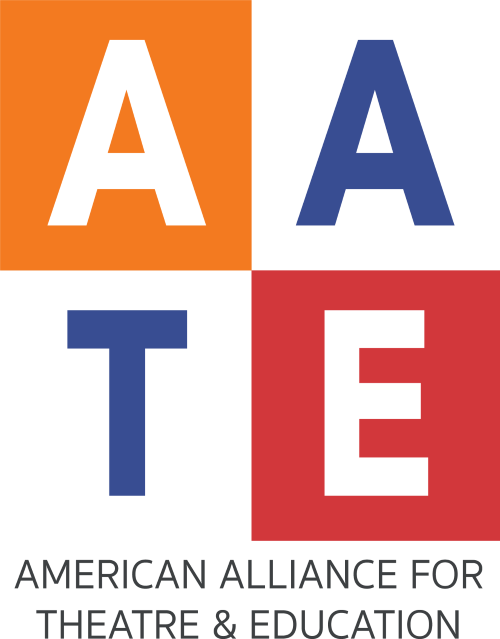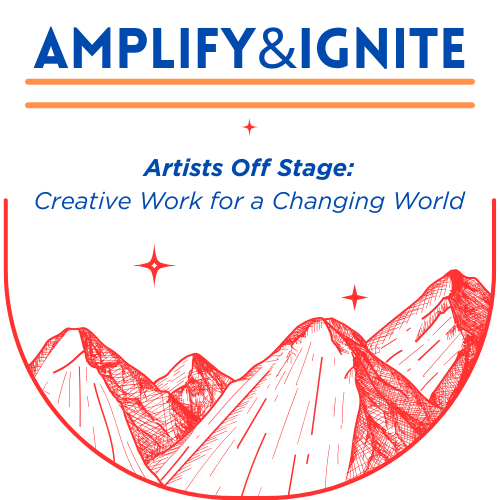- Home
- About AATE
- Membership
- Programs and Events
- Resources
- Networking
- Support AATE
- Online Store
- Contact Us
Amplify & Ignite - Artists Off-Stage: Creative Work for a Changing World
The symposium will be held at November 7-9, 2025
Click HERE to SubmitJoin us for Amplify & Ignite, a Symposium jointly sponsored by AATE’s Research & Scholarship Network and The University of Utah’s Theatre Department. Why This Symposium?In a time of mounting precarity, political repression, and cultural erasure, many artists and educators are reimagining not just what they create, but why and how they create. As traditional paths in the arts become less viable and systems of support shrink, we are witnessing a quiet but powerful shift: artists stepping off stage and into the world in new ways—as collaborators, organizers, healers, and change agents. This symposium will explore how theatre makers and educators are subverting oppressive systems, navigating emotional and political burnout, and using their creative capacities for activism, mutual aid, coalition-building, and civic engagement. How are we training the next generation of theatre artists not just to make performance, but to make change? We will gather to share strategies for navigating scarcity with innovation, building communities of care, and cultivating sustainable, justice-oriented arts practices. This is a space to connect, reflect, and imagine new roles for artists in a world that needs us—often in ways that defy traditional scripts. Call for ProposalsThis symposium invites proposals from theatre artists, educators, researchers, students, and community partners who are engaging in socially-engaged artistry, creative civic practice, community-based work, or experimental scholarship that challenges conventional boundaries. Whether you’re devising new work in response to political realities, using drama as a tool for dialogue and resistance, or creatively collaborating across communities to reimagine what's possible, we want to hear from you! Together, we’ll explore how artists are subverting oppressive systems, navigating emotional and political burnout, and using their creative capacities for activism, mutual aid, coalition-building, and community engagement. We also seek to examine how these shifting practices are documented, studied, and shared as legitimate forms of research. What new methodologies are emerging? What counts as knowledge, and who decides? We welcome proposals that explore (but are not limited to):
Participants are invited to share their curiosities and work via one of the following modes: Collaborative Inquiry & Visioning This is a space for bold imaginings, collective futuring, and expansive dialogue. Proposals in this category should not present polished work, but rather bring a burning curiosity, a messy question, or a deep yearning into the room. These sessions are opportunities to gather with others to dream together, test ideas in progress, and explore possible futures. We especially encourage proposals that take risks with format, embrace ambiguity, or call on participants to help co-create something that doesn’t yet exist. Bring your what-ifs, your half-formed ideas, your creative restlessness—and let’s make space for something new to emerge in community! Sessions might include:
Workshops You might:
Performances We invite performances that:
Audio/Visual Media Presentations may include:
Papers & Narratives Proposals in this category may include:
Other This might include:
Let us know what you want to do, what you need to do it, and how others will participate. Think experimental, playful, communal, and emergent—we’re excited to make space for new ways of working and being together. Session Format:Concurrent sessions will be scheduled in 75-minute blocks and we anticipate combining presentations linked by theme, content and/or practice. We invite you to propose sessions individually or as a collaboration with others. For paper and narrative presentations, we will schedule presentations in triads, allowing each presenter 20 minutes to present followed by 15 minutes of collective discussion. For all other presentation types, be sure to include the anticipated time frame in your proposal so we can plan accordingly. Standalone 75-minute presentations are possible, but will be limited. Proposal Details:Your proposal should be under 300 words and written as you would want it to appear in the program, as an invitation for Symposium attendees to participate in or witness or your session. Proposals are due on Friday, August 8, 2025 SYMPOSIUM SPONSORS: |

